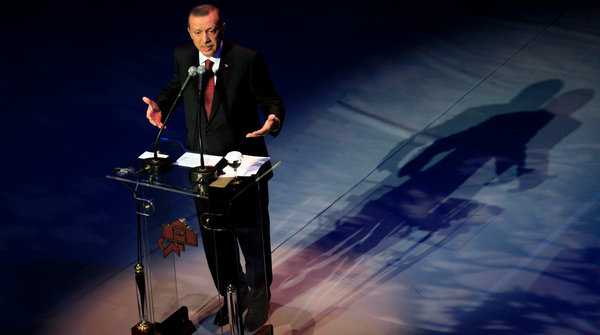By ANTHONY SHADID
ISTANBUL — Not so long ago, the foreign policy of Turkey revolved around a single issue: the divided island of Cyprus. These days, its prime minister may be the most popular figure in the Middle East, its foreign minister envisions a new order there and its officials have managed to do what the Obama administration has so far failed to: position themselves firmly on the side of change in the Arab revolts and revolutions.
 Prime Minister Recep Tayyip Erdogan of Turkey in Cairo this month. He has recently visited Tunisia and Libya, where revolutions have also ousted governments.
Prime Minister Recep Tayyip Erdogan of Turkey in Cairo this month. He has recently visited Tunisia and Libya, where revolutions have also ousted governments.
No one is ready to declare a Pax Turkana in the Middle East, and indeed, its foreign policy is strewn this year with missteps, crises and gains that feel largely rhetorical. It even lacks enough diplomats. But in an Arab world where the United States seems in retreat, Europe ineffectual and powers like Israel and Iran unsettled and unsure, officials of an assertive, occasionally brash Turkey have offered a vision for what may emerge from turmoil across two continents that has upended decades of assumptions.
Not unexpectedly, the vision’s center is Turkey.
“Turkey is the only country that has a sense of where things are going, and it has the wind blowing on its sails,” said Soli Ozel, a professor of international relations at Istanbul Bilgi University.
The country’s foreign policy seized the attention of many in the Middle East and beyond after Prime Minister Recep Tayyip Erdogan’s tour this month of three Arab countries that have witnessed revolutions: Tunisia, Egypt and Libya. Even Mr. Erdogan’s critics were impressed with the symbolism of the trip.
Though many criticize his streak of authoritarianism at home, the public abroad seemed taken by a prime minister who portrayed himself as the proudly Muslim leader of a democratic and prosperous country that has come out forcefully on the side of revolution and in defense of Palestinian rights.
One Turkish newspaper, supportive of Mr. Erdogan, called the visits the beginning “of a new era in our region.” An Egyptian columnist praised what he called Mr. Erdogan’s “leadership qualities.” And days later, Foreign Minister Ahmet Davutoglu spoke boldly of an axis between Egypt and Turkey, two of the region’s most populous and militarily powerful countries, that would underpin a new order in the region, one in which Israel would stay on the margins until it made peace with its neighbors.
“What’s happening in the Middle East is a big opportunity, a golden opportunity,” a senior Turkish official said in Ankara, the capital. He called Turkey “the new kid on the block.”
The trip marked a pivot after what many had viewed as a series of setbacks for a country that, like most of the world, utterly failed to predict the revolts in the region.
After long treating the Arab world with a measure of disdain — Israel and Turkey were strategic allies in the 1990s — Turkey had spent years cultivating ties with Col. Muammar el-Qaddafi in Libya and President Bashar al-Assad in Syria. More than 25,000 Turks worked in Libya, and Syria was seen as the gateway to Turkey’s ambitions to economically integrate part of the Middle East.
Even after the uprisings erupted, Turkey opposed NATO’s intervention in Libya. Until last month, it held out hope that Mr. Assad, despite evidence to the contrary, could oversee a transition in Syria.
Though Mr. Erdogan came out early in demanding that President Hosni Mubarak step down in Egypt — at the very time American officials were trying to devise ways for him to serve out his term — that stance came with little cost. Mr. Mubarak and Mr. Erdogan were not fond of each other, and Egyptian officials resented Turkey’s growing profile.
“The old policy collapsed, and a new policy is required now toward the Middle East,” said Ersin Kalaycioglu, a professor of political science at Sabanci University in Istanbul.
In an interview, Mr. Davutoglu, viewed by many as the architect of Turkey’s engagement with the region, laid out that new policy. In addition to a proposed alliance with Egypt, he said Turkey would position itself on the side of the revolts, especially in neighboring Syria, which represents Turkey’s biggest challenge. He insisted that Turkey could help integrate the region by virtue of its economy, with its near tripling of exports since Mr. Erdogan’s Justice and Development Party took power in 2002.
Next Page »
A version of this article appeared in print on September 27, 2011, on page A4 of the New York edition with the headline: In Riddle of Mideast Upheaval, Turkey Offers Itself as an Answer.
via In Riddle of Mideast Upheaval, Turkey Offers Itself as an Answer – NYTimes.com.